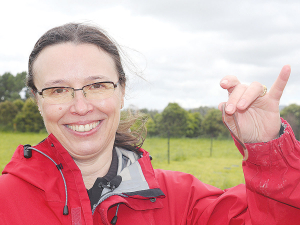Much of the scientific work being carried out at the Massey University led regenerative agriculture project, Whenua Haumanu, is below the ground.
Recently an open day was held by Massey to showcase the progress being made on what is said to be the most comprehensive agriculture research programme ever carried out in NZ, and one that is attracting considerable interest from overseas.
The government-funded project is now into year three of a seven-year study. The research plots on the dairy and sheep farms bristle with new technologies to determine such things as pasture growth, nitrogen leaching and optimum grazing timeframes.
But for associate professor Maria Minor, whose speciality is soil ecology and zoology, a simple spade is the main tool for determining what is happening in the soil on the trial plots. Put that spade in the ground and take a sod of soil and the chances are that there will be one hundred earthworms to see.
Earthworms, to some degree like bees in orchards, are a vital but often unrecognised component in helping to produce high quality pasture.
Minor says the worms, of which there are many different species, are an important part of maintaining healthy soil. For a start, their mere presence in large numbers is an indicator of highly fertile pasture.
They act as vacuum cleaners of unwanted organic matter on the soil surface. Just below and sometimes quite deep below the ground, they cultivate and aerate the soil, improve soil structure and feed soil microbes.
When she dug up a random sod of earth, Minor noted there were four different species – some small and some much larger.
“The little one is a surface dweller, so it lives in the base of plants and in the root zone and feeds on organic material, including dung and pieces of dead plants and what this does is that it reduces the accumulation of that stuff on the soil surface,” she says.
Then there are larger black-headed worms that carry out a completely different task.
“They go vertically in the soil profile, so they provide channels for the water to drain quickly and for the air to get to the plant roots. They also take organic material down to the deeper soil, increasing the soil carbon pool. Finally, they take mineral-rich soil from deep down and take it up to the root zone,” she says.
Their digestion makes nutrients more available to plants. The result is the increase in pasture productivity.
Minor says on a good NZ pasture one should expect to find up to four hundred worms per square metre, which she says might sound a lot to some people, but isn’t.
Minor says on a good NZ pasture one should expect to find up to four hundred worms per square metre, which she says might sound a lot to some people, but isn’t.
“They burrow well down into the soil, create a small chamber and cover themselves with a layer of slime, curl up and hibernate until the autumn rains arrive,” she says.
Each individual earthworm takes 4-6 months to grow up to maturity and lives for more than a year. They reproduce relatively quickly in pastures – worm numbers build up in response to availability of food and soil moisture and decline from drought and from heavy stock treading. Although not native to NZ, the lowly worms help to maintain a healthy and productive pasture.



















